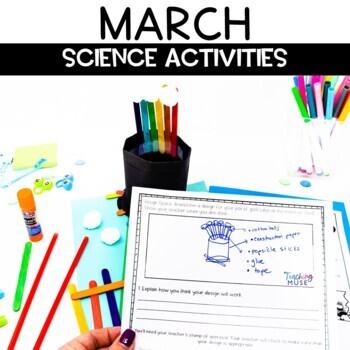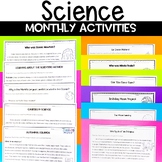March Science Experiments and Activities
- Zip
- Google Apps™

Also included in
- ⭐️⭐⭐️⭐️⭐️ "My students are really enjoying these seasonal science activities so far. I'm so excited I found them! This is really going to step up my science game! Thank you!" - ArianeIntegrate more science into your curriculum using fun and engaging seasonal content that combines monthly topics with haPrice $44.00Original Price $55.00Save $11.00
Description
Integrate March holidays and science into your classroom using this collection of hands-on, print, and digital activities that cover fun, topical concepts. Seasonal concepts include reading articles to continue to build literacy skills, STEM activities to cultivate engineering skills, hands-on demonstrations, and a research project. March topics cover National Nutrition Month, Women's History Month, Spring Equinox, March Madness, and St. Patrick's Day. Science topics cover equinoxes, building and engineering, nutrition and the process of digestion, and literacy skills. All activities include print and digital options to allow for flexibility in the classroom. These science activities help complement your science curriculum, integrate science and literacy skills, or be used as sub plans.
Like this month's topics? Check out the year-long bundle and save 20% by clicking here.
March Science Topics cover:
- National Nutrition Month
- Women's History Month
- Spring Equinox - March 20
- March Madness
- St. Patrick's Day - March 17
Students will learn about:
- Nutrition
- Digestive human body system
- Problem-solving and engineering
- Seasons
- Equinox
- Women in the field of STEM
- Famous scientist, Garrett Morgan
March Science Activities include:
- Teacher tips and instructions to implement the activities into your classroom
- Digital instructions to distribute the Google Slides activities through your secure learning management system such as Google Classroom, Schoology, Canvas, etc.
- Nutrition Article: Students will learn about the nutritional needs the human body needs to work and function properly
- Digestive system lab demonstration: Students will observe how mechanical digestion helps break down food within our bodies.
- Women's History Month project: Students will research facts and contributions of famous women in the field of STEM
- Basketball STEM activity to integrate March Madness in your classroom. Students will work collaboratively (or independently) to design, engineer, and test a basketball hoop out of materials.
- St. Patrick's Day Build a Pot of Gold STEM activity will have students come up with a creative design to build the biggest pot of gold.
- Spring Equinox to learn about how and why Earth has seasons. Students will read about the spring equinox, create a sun, Earth, moon model, answer questions, and complete a graphic organizer.
- Scientist in the News article on Garrett Morgan who shares a birthday in March
- Answer keys and rubrics where applicable
Teacher feedback:
- I already have the women scientists ready to use next month. Can't wait to get together with our buddy class to try out the STEM challenges! And the biography passage is perfect for reading intervention groups.
- My students loved the stem challenge of making a basketball game with only recyclable materials that they could play with a Ping-Pong ball. They were very engaged and willing to continually try to improve it.
- This was an amazing resource to use as a PBL and test prep activity that my students adored and begged for more. Thank you. We actually used them for indoor recess as a way to "test them out" and vote on the team with the best one. Thank you.
- This was one of the best STEM projects for March Madness. Man students loved it. Thank you.
Other science activities you might be interested in:
Digestive system:
- Anchor Chart Posters
- Vocabulary, Nonfiction Reading and Sketch Note Activity
- Digital Version of the Nonfiction Reading Activity
- Flip Book
- Task Cards
- Winter Review
St Patrick's Day:
- Trap a Leprechaun Activity
- Nonfiction Article and Activity
- States of Matter Review
- Acids and Bases Review Activity
Women's History Month:
- Famous Women in History Project
- Women in Stem Banners and Project
- Women's History Month Classroom Decor
- Inspirational Quote Banner
Famous Scientist and Inventors:
Kindly Note: If you have questions, do not hesitate in emailing me at Teaching Muse Email
PLEASE PREVIEW BEFORE PURCHASING
____________________________________________________________________________________
Thank you for visiting Teaching Muse. I would love for you to become a follower.
Teaching Muse followers receive new product information and discounts on any new items!
____________________________________________________________________________________
All rights reserved by Teaching Muse. This product is to be used by the original downloader ONLY. Copying for more than one teacher, classroom, department, school, or school system is prohibited. Additionally, this product may not be distributed or displayed digitally for public view. Failure to comply is a copyright infringement and violates the Digital Millennium Copyright Act (DMCA). Intended for classroom and personal use ONLY.






